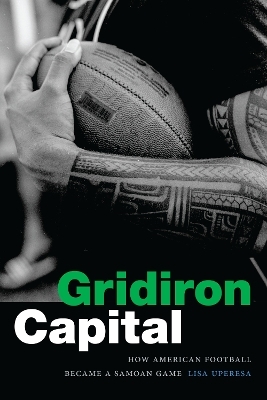
Gridiron Capital
How American Football Became a Samoan Game
Seiten
2022
Duke University Press (Verlag)
978-1-4780-1546-8 (ISBN)
Duke University Press (Verlag)
978-1-4780-1546-8 (ISBN)
Lisa Uperesa charts the cultural, historical, and social dynamics that have made American football so central to Samoan culture.
Since the 1970s, a “Polynesian Pipeline” has brought football players from American Sāmoa to Hawaii and the mainland United States to play at the collegiate and professional levels. In Gridiron Capital Lisa Uperesa charts the cultural and social dynamics that have made football so central to Samoan communities. For Samoan athletes, football is not just an opportunity for upward mobility; it is a way to contribute to, support, and represent their family, village, and nation. Drawing on ethnographic fieldwork, archival research, and media analysis, Uperesa shows how the Samoan ascendancy in football is underpinned by the legacies of US empire and a set of imperial formations that mark Indigenous Pacific peoples as racialized subjects of US economic aid and development. Samoan players succeed by becoming entrepreneurs: building and commodifying their bodies and brands to enhance their football stock and market value. Uperesa offers insights into the social and physical costs of pursuing a football career, the structures that compel Pacific Islander youth toward athletic labor, and the possibilities for safeguarding their health and wellbeing in the future.
Duke University Press Scholars of Color First Book Award recipient
Since the 1970s, a “Polynesian Pipeline” has brought football players from American Sāmoa to Hawaii and the mainland United States to play at the collegiate and professional levels. In Gridiron Capital Lisa Uperesa charts the cultural and social dynamics that have made football so central to Samoan communities. For Samoan athletes, football is not just an opportunity for upward mobility; it is a way to contribute to, support, and represent their family, village, and nation. Drawing on ethnographic fieldwork, archival research, and media analysis, Uperesa shows how the Samoan ascendancy in football is underpinned by the legacies of US empire and a set of imperial formations that mark Indigenous Pacific peoples as racialized subjects of US economic aid and development. Samoan players succeed by becoming entrepreneurs: building and commodifying their bodies and brands to enhance their football stock and market value. Uperesa offers insights into the social and physical costs of pursuing a football career, the structures that compel Pacific Islander youth toward athletic labor, and the possibilities for safeguarding their health and wellbeing in the future.
Duke University Press Scholars of Color First Book Award recipient
Lisa Uperesa is Senior Lecturer in Pacific Studies at the University of Auckland.
Preface ix
Acknowledgments xv
Introduction. Fabled Futures and Gridiron Dreams 1
1. Malaga: Forging New Pathways in Sport and Beyond 23
2. Football, Tautua, and Faʻasāmoa 48
3. Producing the Gridiron Warrior 71
4. Gridiron Capital 103
5. “Faʻmālosi!”: Strength, Injury, and Sacrifice 123
Conclusion. Niu Futures 151
Glossary 155
Notes 159
Bibliography 185
Index 211
| Erscheinungsdatum | 10.05.2022 |
|---|---|
| Zusatzinfo | 19 illustrations |
| Verlagsort | North Carolina |
| Sprache | englisch |
| Maße | 152 x 229 mm |
| Gewicht | 476 g |
| Themenwelt | Sozialwissenschaften ► Ethnologie |
| Sozialwissenschaften ► Soziologie ► Mikrosoziologie | |
| ISBN-10 | 1-4780-1546-2 / 1478015462 |
| ISBN-13 | 978-1-4780-1546-8 / 9781478015468 |
| Zustand | Neuware |
| Haben Sie eine Frage zum Produkt? |
Mehr entdecken
aus dem Bereich
aus dem Bereich


